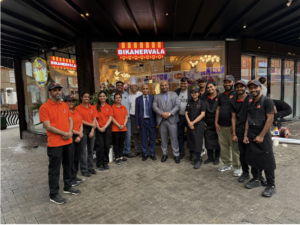Among those opposed to President Trump’s tariffs on imports from China: a legal group funded by some of the biggest names in conservative politics.
Last week, a Florida business owner challenged the Trump administration’s moves in court, arguing that her company, Simplified, which makes notebooks and planners, was harmed by the dramatic trade war with China that has only deteriorated further since the lawsuit was filed.
Her lawyers are from the New Civil Liberties Alliance, a libertarian-leaning nonprofit that counts among its financial backers Donors Trust, a group with ties to the billionaire Leonard A. Leo, who is a co-chairman of the Federalist Society.
The Federalist Society is an influential legal group that advised Mr. Trump through the confirmation of justices he appointed to form the current conservative supermajority on the Supreme Court, though some in Mr. Trump’s circle came to believe that its leaders were out of step with the president’s political movement.
Another donor to New Civil Liberties Alliance is Charles Koch, the billionaire industrialist and Republican megadonor.
In what appeared to be the first tariff-related lawsuit against the Trump administration, the founder of Simplified, Emily Ley, argued that President Trump overstepped his authority in February when he first imposed new import taxes on Chinese goods. Since then, China has retaliated with its own tariffs, and Mr. Trump has escalated the fight with more levies. All Chinese imports face a minimum tariff rate of 145 percent as of Thursday, a dramatic increase.
Tax filings since 2017, when the New Civil Liberties Alliance was founded, show that it has received millions in financial support from a network of powerful conservative groups including both the Charles Koch Foundation and Donors Trust, which has financial ties to Mr. Leo.
On Wednesday, after days of turmoil on the stock and markets, Mr. Trump announced a three-month reprieve on the punishing tariffs he had imposed on most of America’s major trading partners in an effort to redress trade deficits, leaving in place only a base line 10 percent tariff for all imports.
Still, president has remained committed to ratcheting up the pressure on China, whose leaders have vowed to fight back.
While a number of top Republicans in Congress have expressed chagrin at the tariffs, only a few have second-guessed the president publicly.
But the lawsuit illustrates the growing divisions within the party’s elite between traditional conservatives who worry about the long-term effect of tariffs on the economy and Mr. Trump’s ideological allies, who have applauded his “by any means necessary” approach to reversing years of trade deficits.
Mr. Koch is no stranger to opposing Mr. Trump. The donor network he established with his brother David Koch attempted to finance challenges to Mr. Trump during the 2024 election cycle, steering around $70 million to Republican campaigns that were focused on moving away from the president’s priorities.
Both Mr. Koch and Mr. Leo have enjoyed considerable success in advancing conservative ideas and policy by paying for strategic lawsuits and doling out financial support through a network of right-leaning legal groups.
For its part, the New Civil Liberties Alliance has recently established its bona fides through a number of high-profile victories, often focusing on cases aimed at beating back regulations and advancing libertarian causes.
Just last year, the organization notched two prominent wins.
It represented the plaintiffs in a case that ultimately resulted in the Supreme Court dramatically curtailing the regulatory power of federal agencies. The 6 to 3 decision swept aside decades of precedent and handed the conservative legal movement a long-desired win in its efforts to pare back government regulation.
That lopsided split along ideological lines was made possible by the justices Mr. Trump appointed on advice from Mr. Leo’s Federalist Society.
Notably, the New Civil Liberties Alliance also helped reverse one of Mr. Trump’s policies from his first term — a ban on bump stocks that his administration imposed after a gunman using the device massacred 60 people in Las Vegas in the deadliest mass shooting in modern American history. The group represented a man challenging Mr. Trump’s ban and succeeded in convincing the Supreme Court to strike it down last year in another 6 to 3 decision.
The complaint filed on behalf of Ms. Ley, in Federal District Court for the Northern District of Florida, asked a judge to declare Mr. Trump’s China-related executive orders unconstitutional and to bar Customs and Border Protection from enforcing the tariffs.
It argued that Mr. Trump was circumventing Congress by unlawfully using the International Emergency Economic Powers Act of 1977 to impose the tariffs. The law gives the president the broad authority to regulate a variety of economic transactions following a declaration of national emergency.
In its complaint, the organization argued the law does not give Mr. Trump the power to impose tariffs by simply by declaring that trade deficits constitute a national emergency, and if he is allowed to do so, he “will have nearly unlimited authority to commandeer Congress’s power over tariffs.”
“He would be empowered to declare a national emergency based on some long-running national problem, then impose tariffs purportedly in the name of that emergency — thus sidestepping the detailed constraints Congress has placed on the tariff authority it has granted,” the complaint said.








